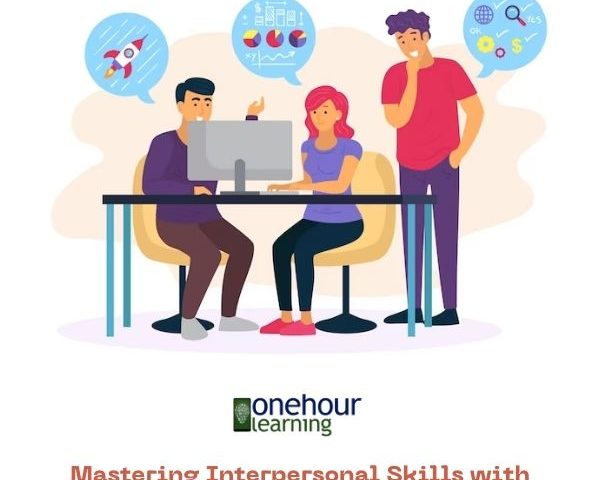Mastering Interpersonal Skills with Behavioural Courses

Behavioural Courses: A Path to Better Communication and Understanding
July 27, 2023
Behavioural Courses 101: Unravelling Human Nature
July 28, 2023Introduction
In today’s interconnected world, mastering interpersonal skills is crucial for personal and professional success. Whether you’re interacting with colleagues, clients, or loved ones, effective communication and strong interpersonal skills can make all the difference. Fortunately, there are behavioural courses specifically designed to help individuals in mastering interpersonal skills. In this blog, we’ll explore the transformative impact of these courses and how they can empower you to navigate social interactions with confidence and finesse.
The Importance of Interpersonal Skills
Interpersonal skills play a fundamental role in our daily lives. From expressing ourselves clearly to actively listening and empathizing with others, these skills enable us to build meaningful connections, resolve conflicts, and foster positive relationships. By enrolling in behavioural courses for improving interpersonal skills, individuals can acquire the necessary tools to excel in various personal and professional settings.
Enhancing Communication Techniques
Interpersonal communication skills training forms a core component of behavioural courses. Through interactive exercises and practical insights, participants learn effective communication techniques in interpersonal relationships. These courses emphasize active listening, non-verbal cues, assertiveness, and the art of conveying ideas. By honing these skills, individuals can communicate more persuasively, collaborate seamlessly, and forge stronger connections with others.
Developing Social Intelligence
Behavioural courses go beyond the basics of communication and delve into the intricacies of social intelligence. Courses like those offered by OneHourLearning provide a holistic approach to developing interpersonal skills through behavioural training. Participants learn how to navigate social dynamics, understand different perspectives, and adapt their communication style to diverse audiences. This deeper understanding of human behaviour enhances social interactions, fostering a more inclusive and harmonious environment.
Overcoming Challenges
Improving interpersonal skills is not without its challenges. However, with the guidance of expert instructors and tailored course materials, individuals can effectively address these obstacles. Behavioural courses provide practical strategies and real-life scenarios that equip participants with the necessary skills to overcome communication barriers, manage conflicts, and build rapport with ease. Through continuous practice and feedback, participants gain the confidence to navigate challenging interpersonal situations successfully.
The Transformative Impact
The impact of mastering interpersonal skills with behavioural courses extends far beyond personal relationships. Employers increasingly value individuals with strong communication and interpersonal abilities. These skills are essential for effective teamwork, leadership, and customer interactions. By investing in your interpersonal skills through courses like OneHourLearning’s program, you can boost your career prospects and become a highly sought-after professional.
The Long-Term Impact of Mastering Interpersonal Skills
When individuals invest their time and energy in mastering interpersonal skills with behavioural courses, the benefits extend far beyond immediate interactions. These skills have had a profound and lasting impact on personal and professional life. In the personal realm, mastering interpersonal skills allows individuals to build stronger and more fulfilling relationships. Effective communication techniques enable them to express their thoughts and feelings clearly, resulting in better understanding and reduced conflicts. Empathy, a key component of interpersonal skills, helps individuals connect with others on a deeper level, fostering trust, compassion, and mutual support. As a result, personal relationships thrive, leading to increased happiness, satisfaction, and overall well-being.
Professionally, individuals with strong interpersonal skills are highly sought after in the workplace. They excel in team collaborations, easily build rapport with colleagues and clients, and are effective leaders. Strong interpersonal skills also contribute to a positive work environment, improving morale, productivity, and employee retention. Individuals who can navigate conflicts with diplomacy and maintain professional relationships often enjoy better career prospects and advancement opportunities.
Furthermore, enhancing social interactions through behavioural courses enhances networking abilities. Effective networking is essential for expanding professional connections, accessing new opportunities, and staying updated with industry trends. By developing interpersonal skills, individuals become more adept at establishing meaningful connections, fostering mutually beneficial relationships, and creating a robust professional network.
Conclusion
It is important to note that mastering interpersonal skills is an ongoing process. Behavioural courses provide a foundation, but individuals must continue to practice and refine their skills in real-life scenarios. Regular self-reflection, seeking feedback, and embracing continuous learning are essential for sustained growth and development.
Mastering interpersonal skills with behavioural courses has a profound and long-lasting impact on personal and professional life. These skills enhance relationships, improve communication, and contribute to career success. By investing in the development of interpersonal skills, individuals can unlock their full potential, opening doors to new opportunities and fulfilling life both personally and professionally.




